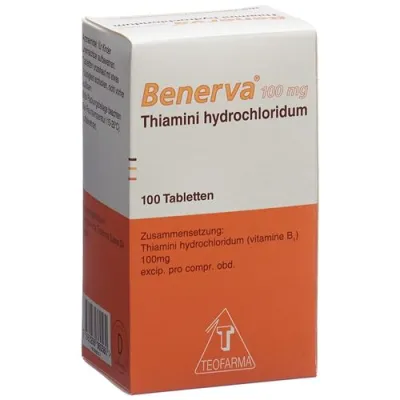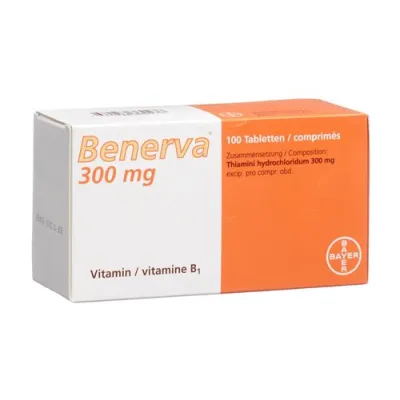Vitamin deficiency
(1 Pages)
Becozym forte drag 50 pcs
Becozym forte contains seven important vitamins from the B group. Like all vitamins, the B group vitamins cannot be produced by the body itself, but must be ingested with food. The vitamins of the B group are part of very specific enzymes (ferments). They have the task of making carbohydrates, fats and protein from food usable for energy production, for the structure and function of nerves, blood, skin and mucous membranes as well as muscles. The interaction of the vitamins of the B group is of the utmost importance. Becozym forte contains the vitamins of the B group that the body needs. It is therefore used to prevent and treat existing vitamin B deficiencies, which can have the following causes: One-sided nutrition with bland diets, slimming diets; Excessive alcohol consumption and a lack of appetite, such as occurs with feverish illnesses. Medicines that neutralize the vitamin effect. These include, in particular, preparations to combat severe infections (anti-infectives), preparations that inhibit the growth of cells (cytostatics), and those that are taken to prevent epileptic seizures (anticonvulsants). Liver diseases that cause the incorporation of the vitamins in the enzymes. Chronic alcoholism and its consequences, such as damage to the liver, heart and nervous system. Swissmedic-approved patient information Becozym® forteBayer (Schweiz) AGWhat is Becozym forte and when is it used?Becozym forte contains seven important vitamins from the B group. Like all vitamins, the B group vitamins cannot be produced by the body itself, but must be ingested with food. The vitamins of the B group are part of very specific enzymes (ferments). They have the task of making carbohydrates, fats and protein from food usable for energy production, for the structure and function of nerves, blood, skin and mucous membranes as well as muscles. The interaction of the vitamins of the B group is of the utmost importance. Becozym forte contains the vitamins of the B group that the body needs. It is therefore used to prevent and treat existing vitamin B deficiencies, which can have the following causes: One-sided nutrition with bland diets, slimming diets; Excessive alcohol consumption and a lack of appetite, such as occurs with feverish illnesses.Medicines that neutralize the vitamin effect. These include, in particular, preparations to combat severe infections (anti-infectives), preparations that inhibit the growth of cells (cytostatics), and those that are taken to prevent epileptic seizures (anticonvulsants).Liver diseases that impair the incorporation of the vitamins in the enzymes.Chronic alcoholism and its consequences, such as damage to the liver, heart and nervous system.What should that be observed?For diabetics: 1 dragee contains 270 mg carbohydrates = 4.6 kJ (1.1 kcal). Becozym forte contains lactose. When should Becozym forte not be taken?If you are allergic to one of the active ingredients or one of the excipients according to the composition, you must not take the preparation. When is caution required when taking Becozym forte?Acute and chronic overdoses increase the risk of side effects. Intake of vitamins and minerals from other sources (fortified foods, dietary supplements, or concomitant use of other medications) must be considered.Patients taking other vitamin products or medications, on specific diets, or under medical supervision , must discuss taking Becozym forte with their doctor, pharmacist or druggist.Patients with severe kidney failure must discuss taking Becozym forte with their doctor.If you need laboratory tests and are taking biotin, please tell your doctor. Biotin can affect the results.Itell your doctor, pharmacist or druggist if you suffer from other diseases, allergies or are taking other medicines (including those you bought yourself!)! Can Becozym forte be taken/used during pregnancy or breastfeeding?You can take vitamins and minerals during pregnancy in an amount that corresponds to the daily requirement and take while breastfeeding. However, with daily doses such as those supplied with Becozym forte, you should only take this medicine after consulting your doctor. How do you use Becozym forte?The amount of treatment to be taken daily (daily dose) depends on your age and the extent of the imminent or existing vitamin deficiency B group. Unless otherwise specified by the doctor, pharmacist or druggist, the following guidelines apply to the dosage: Daily dose for prevention: Adults and adolescents from 12 years of age: 1 dragée once. Daily dose for treatment: Adults and adolescents from 12 years of age: 1 dragée two or three times. You can take the dragées whole with liquid. Becozym forte is not intended for use in children under the age of 12. Stick to the dosage given in the package leaflet or as prescribed by your doctor. If you think the medicine is too weak or too strong, talk to your doctor, pharmacist or druggist. What side effects can Becozym forte have?The following side effects can occur after taking Becozym forte: Headache, allergic to anaphylactic reactions (reddening of the skin, rash, itching, swelling of the tissue (oedema) or face (angioedema), shortness of breath, asthma, diarrhea, drop in blood pressure, heart problems, anaphylactic shock). The urine may turn yellow while you are taking Becozym forte. The coloring is due to the excreted vitamin B2 (riboflavin) and is harmless. If you get any side effects, talk to your doctor, pharmacist or druggist. This also applies in particular to side effects that are not listed in this leaflet. What else needs to be considered?The medicinal product may only be used up to the date marked «EXP» on the container. Storage instructionsStore the medicine at room temperature (15-25 °C) and keep out of the reach of children. Your doctor, pharmacist or druggist can provide you with further information. These people have the detailed information for specialists. What does Becozym forte contain?Active ingredients1 dragée contains 15 mg vitamin B as an active ingredient1 (thiamine nitrate), 15 mg vitamin B2 (riboflavin), 10 mg vitamin B6 (pyridoxine hydrochloride), 10 µg vitamin B12 (cyanocobalamin), 0.15 mg biotin, 25 mg calcium pantothenate, 50 mg nicotinamide. ExcipientsArom.: Vanillinum, Ethylvanillinum et alia, Color: E 150c. Approval number20407 (Swissmedic). Where can you get Becozym forte? What packs are available?In pharmacies and drugstores, without a doctor's prescription. Dragées: 20, 50 and 100. Authorization holderBayer (Switzerland) AG, Zurich. This leaflet was last checked by the drug authority (Swissmedic) in December 2019. ..
32.78 USD
Benerva tablets 100 mg 100 pcs
Vitamin B1 plays an important role in the breakdown of carbohydrates such as sugar and starch. For example, the organism needs around 0.2 mg of vitamin B1 to break down 100 g of chocolate. Vitamin B1 is also involved in the function of nerves and muscles. A lack of vitamin B1 thus leads to disorders in the utilization of carbohydrates, to nerve diseases and muscle weakness. Benerva is used to supplement an insufficient vitamin B1 intake with food and to cover an increased requirement. Insufficient intake: Vitamin B1 is mainly found in the outer shell of grains and in yeast. A vitamin B1 deficiency can occur if you mainly eat finely ground grain flour instead of whole flour. Use in the event of a vitamin B1 deficiency requires the recommendation of a doctor or pharmacist. Increased need: The need is increased in the case of insufficient absorption by the body as a result of gastrointestinal diseases, alcohol abuse, heavy physical work as well as during pregnancy and lactation. Swissmedic-approved patient informationBenerva®Farmaceutica Teofarma Suisse SAWhat is Benerva and when is it used?Vitamin B1 plays an important role in breaking down carbohydrates such as sugar and starch. For example, the organism needs around 0.2 mg of vitamin B1 to break down 100 g of chocolate. Vitamin B1 is also involved in the function of nerves and muscles. A lack of vitamin B1 thus leads to disorders in the utilization of carbohydrates, to nerve diseases and muscle weakness. Benerva is used to supplement an insufficient vitamin B1 intake with food and to cover an increased requirement. Insufficient intake: Vitamin B1 is mainly found in the outer shell of grains and in yeast. A vitamin B1 deficiency can occur if you mainly eat finely ground grain flour instead of whole flour. Use in the event of a vitamin B1 deficiency requires the recommendation of a doctor or pharmacist. Increased need: The need is increased in the case of insufficient absorption by the body as a result of gastrointestinal diseases, alcohol abuse, heavy physical work as well as during pregnancy and lactation. When not to use Benerva?You must not take Benerva if you are allergic to any of its ingredients. The tablets contain lactose and sucrose, so you must not take Benerva if you suffer from galactose or fructose intolerance, Lapp lactase deficiency, impaired absorption of glucose-galactose in the intestine or sucrase-isomaltase deficiency. When is caution required when taking Benerva?Benerva is also well tolerated in very high doses taken over a long period of time. Nevertheless, stick to the dosage instructions described below. Higher doses are useless as they are quickly excreted in the urine and sweat. Medicines that neutralize gastric acid (antacids) inhibit the absorption of vitamin B1 in the intestine. It is also known that certain tuberculosis and preparations counteract vitamin B1. Your doctor knows which preparations are involved. Ask him/her for advice if you are being treated with any of these medicines; He/she will be happy to provide you with information on how you can still cover your vitamin B1 requirement. Tell your doctor, pharmacist or druggist if you •suffer from other diseases, •have allergies or •Take other medicines (including those you bought yourself!) or use them externally. Can Benerva be taken during pregnancy or while breastfeeding?The vitamin B contained in Benerva may be taken in an amount that corresponds to the daily requirement 1 take during pregnancy and lactation. However, with daily doses such as those supplied with Benerva, you should only take this medicine after consulting your doctor. How do you use Benerva?Adolescents and adults: The tablets are best taken with a meal, whole, with liquid. In the event of insufficient intake or to cover an increased requirement, 100 mg of vitamin B1 (1 tablet of 100 mg) daily or every other day is sufficient. In the case of more severe vitamin B1 deficiency states, your doctor will prescribe higher doses for you. The use and safety in children under 12 years of age has not been systematically evaluated. Follow the dosage given in the package leaflet or prescribed by your doctor. If you think the medicine is too weak or too strong, talk to your doctor, pharmacist or druggist. What side effects can Benerva have?Allergic reactions such as itching, rash, nettle rash and skin swelling and asthma, but also disorders of the gastrointestinal tract such as nausea, vomiting , diarrhea or pain occur. Since excess vitamin B1 is quickly excreted, it cannot - in contrast to vitamins A and D - lead to excessive accumulation in the organism. On the other hand, it is possible that your skin smells of sulfur after very high doses, because the sulphur-containing vitamin B1 is also excreted with the sweat. If you notice side effects that are not described here, you should inform your doctor, pharmacist or druggist. What else needs to be considered?The tablets should be stored at room temperature (15-25 °C). The medicinal product should be kept out of the reach of children and should only be used up to the date marked «EXP» on the container. Your doctor, pharmacist or druggist can provide you with further information. These people have the detailed information for specialists. What does Benerva contain?1 tablet contains: Active ingredient: Thiamine hydrochloride (vitamin B1), 100 mg or 300 mg. Excipients: The 100 mg tablets contain lactose and sucrose. Approval number25636 (Swissmedic) Where can you get Benerva? What packs are available? In pharmacies and drugstores without a doctor's prescription: 100 mg tablets: 100. In pharmacies without a doctor's prescription: 300 mg tablets: 20, 100. Authorization holderFarmaceutica Teofarma Suisse SA, 6901 Lugano. This leaflet was last checked by the drug authority (Swissmedic) in April 2019. ..
27.42 USD
Benerva tablets 300 mg 20 pcs
Vitamin B1 plays an important role in the breakdown of carbohydrates such as sugar and starch. For example, the organism needs around 0.2 mg of vitamin B1 to break down 100 g of chocolate. Vitamin B1 is also involved in the function of nerves and muscles. A lack of vitamin B1 thus leads to disorders in the utilization of carbohydrates, to nerve diseases and muscle weakness. Benerva is used to supplement an insufficient vitamin B1 intake with food and to cover an increased requirement. Insufficient intake: Vitamin B1 is mainly found in the outer shell of grains and in yeast. A vitamin B1 deficiency can occur if you mainly eat finely ground grain flour instead of whole flour. Use in the event of a vitamin B1 deficiency requires the recommendation of a doctor or pharmacist. Increased need: The need is increased in the case of insufficient absorption by the body as a result of gastrointestinal diseases, alcohol abuse, heavy physical work, as well as during pregnancy and lactation. Swissmedic-approved patient informationBenerva®Farmaceutica Teofarma Suisse SAWhat is Benerva and when is it used?Vitamin B1 plays an important role in breaking down carbohydrates such as sugar and starch. For example, the organism needs around 0.2 mg of vitamin B1 to break down 100 g of chocolate. Vitamin B1 is also involved in the function of nerves and muscles. A lack of vitamin B1 thus leads to disorders in the utilization of carbohydrates, to nerve diseases and muscle weakness. Benerva is used to supplement an insufficient vitamin B1 intake with food and to cover an increased requirement. Insufficient intake: Vitamin B1 is mainly found in the outer shell of grains and in yeast. A vitamin B1 deficiency can occur if you mainly eat finely ground grain flour instead of whole flour. Use in the event of a vitamin B1 deficiency requires the recommendation of a doctor or pharmacist. Increased need: The need is increased in the case of insufficient absorption by the body as a result of gastrointestinal diseases, alcohol abuse, heavy physical work, as well as during pregnancy and lactation. When not to use Benerva?You must not take Benerva if you are allergic to any of its ingredients. The tablets contain lactose and sucrose, so you must not take Benerva if you suffer from galactose or fructose intolerance, Lapp lactase deficiency, impaired absorption of glucose-galactose in the intestine or sucrase-isomaltase deficiency. When is caution required when taking Benerva?Benerva is also well tolerated in very high doses taken over a long period of time. Nevertheless, stick to the dosage instructions described below. Higher doses are useless as they are quickly excreted in the urine and sweat. Medicines that neutralize gastric acid (antacids) inhibit the absorption of vitamin B1 in the intestine. It is also known that certain tuberculosis and preparations counteract vitamin B1. Your doctor knows which preparations are involved. Ask him/her for advice if you are being treated with any of these medicines; He/she will be happy to provide you with information on how you can still cover your vitamin B1 requirement. Tell your doctor, pharmacist or druggist if you •suffer from other diseases, •have allergies or •Take other medicines (including those you bought yourself!) or use them externally. Can Benerva be taken during pregnancy or while breastfeeding?The vitamin B contained in Benerva may be taken in an amount that corresponds to the daily requirement 1 take during pregnancy and lactation. However, with daily doses such as those supplied with Benerva, you should only take this medicine after consulting your doctor. How do you use Benerva?Adolescents and adults: The tablets are best taken with a meal, whole, with liquid. In the event of insufficient intake or to cover an increased requirement, 100 mg of vitamin B1 (1 tablet of 100 mg) daily or every other day is sufficient. In the case of more severe vitamin B1 deficiency states, your doctor will prescribe higher doses for you. The use and safety in children under 12 years of age has not been systematically evaluated. Follow the dosage given in the package leaflet or prescribed by your doctor. If you think the medicine is too weak or too strong, talk to your doctor, pharmacist or druggist. What side effects can Benerva have?Allergic reactions such as itching, rash, nettle rash and skin swelling and asthma, but also disorders of the gastrointestinal tract such as nausea, vomiting , diarrhea or pain occur. Since excess vitamin B1 is quickly excreted, it cannot – in contrast to vitamins A and D – accumulate too much in the organism. On the other hand, it is possible that your skin smells of sulfur after very high doses, because the sulphur-containing vitamin B1 is also excreted with the sweat. If you notice side effects that are not described here, you should inform your doctor, pharmacist or druggist. What else needs to be considered?The tablets should be stored at room temperature (15-25 °C). The medicinal product should be kept out of the reach of children and should only be used up to the date marked «EXP» on the container. Your doctor, pharmacist or druggist can provide you with further information. These people have the detailed information for specialists. What does Benerva contain?1 tablet contains: Active ingredient: Thiamine hydrochloride (vitamin B1), 100 mg or 300 mg. Excipients: The 100 mg tablets contain lactose and sucrose. Approval number25636 (Swissmedic) Where can you get Benerva? What packs are available? In pharmacies and drugstores without a doctor's prescription: 100 mg tablets: 100. In pharmacies without a doctor's prescription: 300 mg tablets: 20, 100. Authorization holderFarmaceutica Teofarma Suisse SA, 6901 Lugano. This leaflet was last checked by the drug authority (Swissmedic) in April 2019. ..
28.57 USD
(1 Pages)



